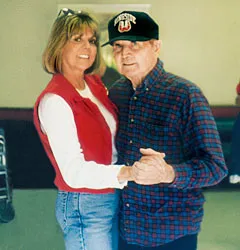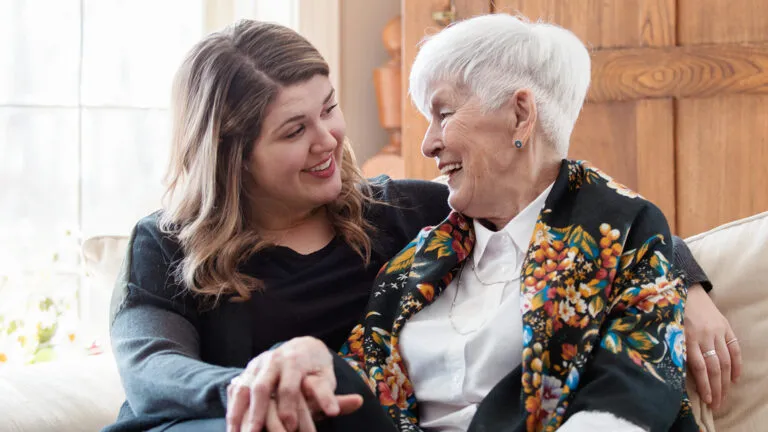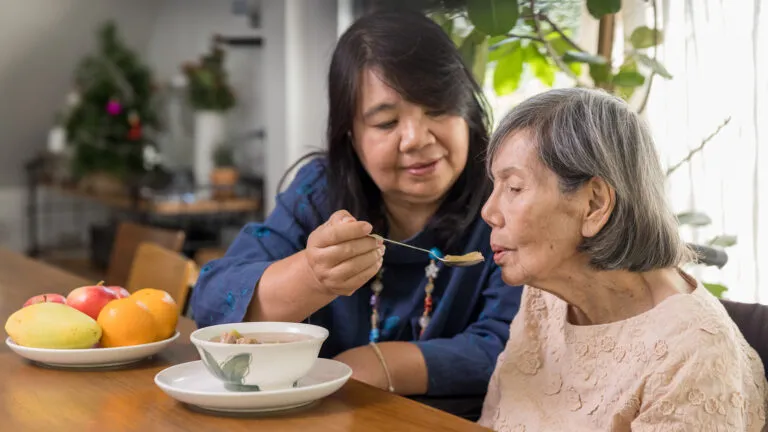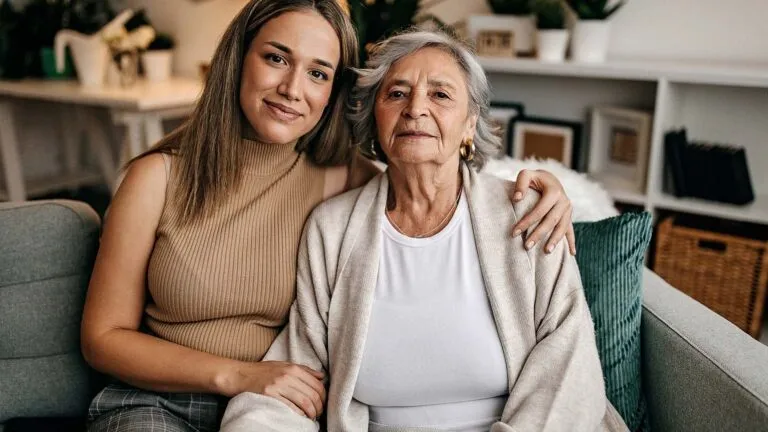The phone call came one cool winter day. It was the manager of the trailer park where my father lived. “Mrs. Rose, something is seriously wrong with your father,” he said. “Would you come down here and check on him?”
It had been a long time since I’d seen my father, and I wasn’t in any hurry to change that. I had left home years ago and never looked back. I married a good man and raised a wonderful daughter. I had my own life now—one that I had worked hard to build.
Ever since his divorce from my mom, my father had lived alone in a small trailer in Southern California, 500 miles away from me.
The real distance between us seemed so much greater. Yet somehow I heard myself promise the manager, “Yes, I’ll be there tomorrow.”
The whole drive down, memories flashed through my mind. Memories of the hurt I’d tried to put behind me. I remembered my father, the proud Marine, imposing military order on our household.
Making sure the first song I learned was the Marine Hymn. Snatching off the Christmas tree all the ornaments the rest of us had put up and rehanging them so there was exactly the same spacing between them.
I remembered the battles he had with my mother and how their near-constant fighting was the soundtrack to my childhood.
I remembered longing to hear my father say just once, “I love you, Patty” only to have him yell at me, “You can’t do anything right!” so many times I actually believed it.
I remembered why I’d walked out the door at age 18, then left the area entirely in my late twenties, telling my dad, “I never want to see you again.”
And now here I was standing outside his trailer, trying to work up the nerve to face him one more time. I knocked on the door, my hand, my whole body, shaking. No answer. Slowly I opened the door. I took a few steps inside and stopped, absolutely stunned.
My father was sitting on his sofa, looking confused and crying. This wasn’t the angry, controlling man I had known growing up. This man was stooped and fragile and smelled like he hadn’t taken a shower in weeks. He seemed broken somehow.
Part of me felt sorry for him, but another part of me was thinking this was exactly the fate he deserved.
I looked around. Everything was in disarray. Papers were stacked up everywhere. Rotting food sat on the counter. The stench was so sickening I had to go outside and get some fresh air. I stood on the porch, overwhelmed by what I’d just seen.
“God, what am I supposed to do now?” I wondered. But as soon as the words escaped me, a sense of sorrow overtook me, and I knew what I had to do. I went back inside and packed up some of my father’s things. He was coming home with me.
Not permanently, mind you. I figured I’d take my father to the hospital, and the doctors would find out what was ailing him. I would have someone come in and clean out the trailer while he was getting medical treatment.
As soon he recovered, I’d take him back there, and my life would return to normal. The sooner, the better, as far as I was concerned.
But things didn’t go the way I planned. The hospital staff did a whole series of tests. Finally a doctor called me in and told me the diagnosis: Alzheimer’s disease.
It didn’t quite register at first. The doctor went on, listing the reasons they had come to this conclusion and explaining the likely progression of the disease. “At this stage, your father can no longer live on his own,” the doctor continued. “He’s going to need some assistance.”
All of a sudden the reality of what he was saying hit me. I panicked. There had to be a mistake. “Isn’t there some medicine for him to take so he can get better?” I asked. I’m sure he could hear the desperation in my voice.
The doctor shook his head. He didn’t have a lot of answers.
My heart sank. My father wasn’t going home to Southern California. Not anytime soon. Not ever. He was my responsibility now.
Back home, I told my husband the news. My dad would be staying on with us indefinitely. “It’s okay, Patty,” Dennis said. “We’ll manage.”
I wished I could believe that. Instead, my mind roiled. How could God allow this to happen? Why was he asking me to take care of the man who never took care of me? It was the last thing in the world I wanted to do. This just wasn’t fair.
Fair or not, though, it was happening, and I had to learn how to deal with it.
The physical tasks of caregiving—cooking for my father, helping him with shaving and bathing and dressing, keeping an eye on him so he didn’t wander off into the road or accidentally hurt himself—those I managed to handle, with a lot of help from Dennis.
It was the emotional part I struggled with. The days of looking after my father turned into weeks, then months, and my resentment grew. Every night I battered God with complaints.
“Why did you put this burden on me?” I demanded furiously. “Nothing’s going to change. He’s always going be the same hard-hearted man who made my childhood miserable.”
Not that he had the ability to carry on long conversations, but I could hardly bring myself to say anything to my father beyond what was absolutely necessary for his care. The more forgetful and confused he became as the Alzheimer’s progressed, the angrier I grew inside.
One night I was putting my litany of complaints before God as usual. “He ruined my childhood. He was angry, bitter and hateful.” Only this time the words reverberated in my head. Angry, bitter, hateful.
Was I talking about my father? Or was I talking about me?
I tried to push the thought away, tried to remind myself of every hurtful thing my father had done to me growing up. But all I could think about was my own hard heart.
“Oh, God, I am so sorry,” I said. “I’m the one who’s angry and bitter. I’m the one who’s been acting hateful. Please help me. Help me change!”
Then it was as if the floodgates opened. All the pain, the conflicted feelings I’d been holding back over the years came rushing out. I sat there for I don’t know how long, crying, talking to God, asking him to help me let go of the ugly feelings I had toward my father.
I didn’t even have the words to explain everything, but I knew he heard me. Because when I was finished, I felt an incredible peace, as if every burden had been lifted from me. I wasn’t angry at my father anymore. I wasn’t bitter. Forgiveness had cleansed all that from me.
For the first time, I was free. Free of the pain of my past. Free to start living the joyful life God wanted me to live.
And that life, I knew, included my father. From then on, I made a real effort to connect with him. The nature of Alzheimer’s meant my dad would forget some very basic day-to-day things yet his memory of long-ago events remained as clear as a bell.
So I asked him about his boyhood and his service as a young Marine in World War II. He had never talked about these things when I was growing up, and I began to understand why.
I discovered how Dad had been traumatized by war. I learned that he too had had a painful childhood. His father had taken his own life, and that loss was so inexplicable to him, Dad had never been able to get over it.
When he told me about his father, Dad sounded so young and frightened and vulnerable. I took him into my arms and held him like he was a lost little boy.
To counterbalance all his painful memories, I told him about the many blessings in my life—my marriage to Dennis, my daughter and granddaughter.
I took Dad everywhere with me, to church, to ball games. I spent hours with him, just talking to him and holding his hand.
Something truly wonderful was happening between us and I didn’t want it to end. I only hoped that my father could feel it too. I could never tell what he understood with the Alzheimer’s.
Until one day at dinnertime. I set his plate before him. Dad looked up at me. “Thank you for taking care of me,” he said, the words coming slowly but clearly. “I love you, Patty.”
It has been eight years since my father died. Now when I think of him, those are the moments I remember. Those moments of, as I put on Dad’s headstone, God’s amazing grace.
Download your FREE ebook, Rediscover the Power of Positive Thinking, with Norman Vincent Peale.





